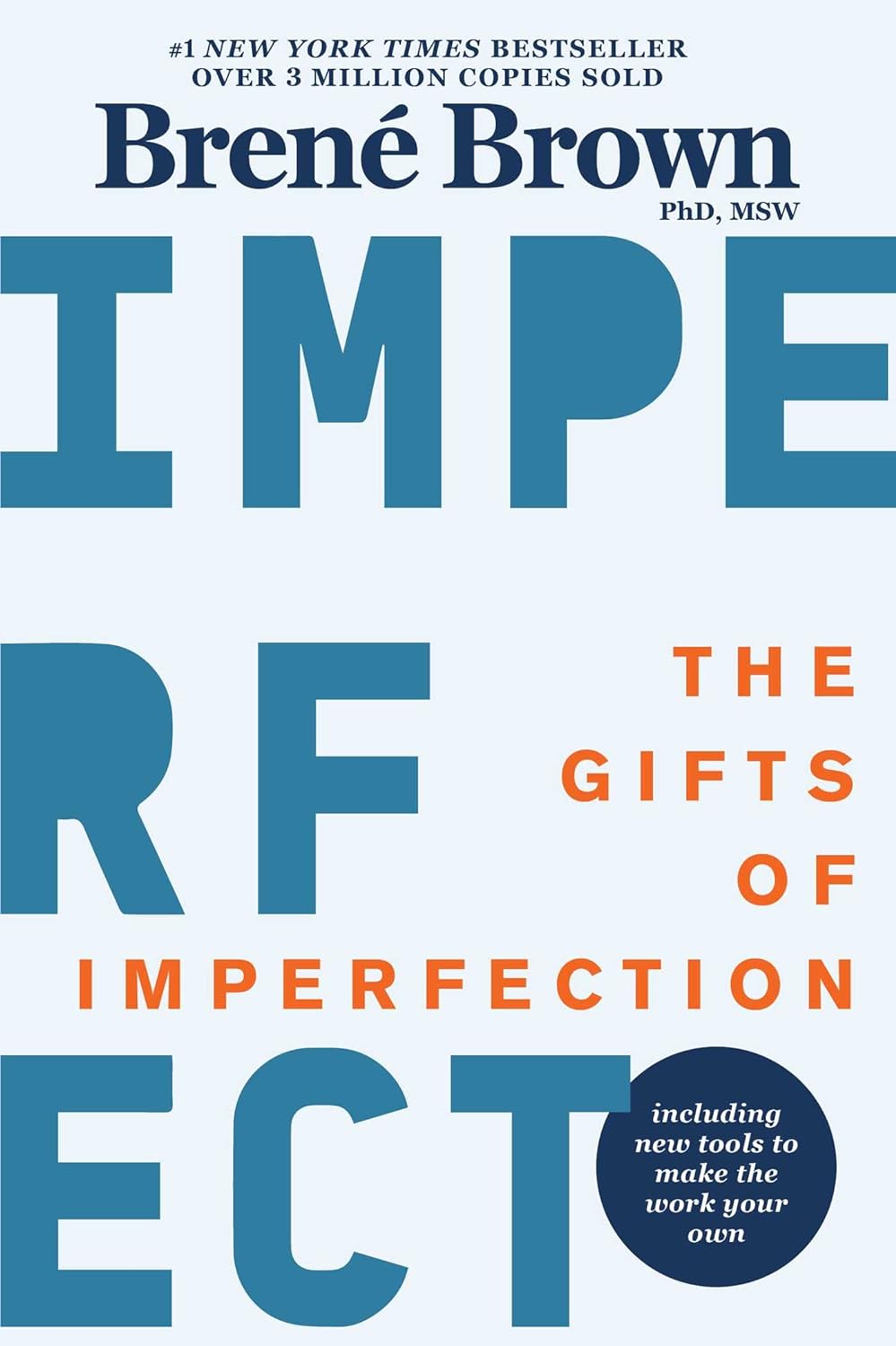Wholehearted Living
Imagine a life where you show up authentically, embracing your vulnerabilities and imperfections with courage and compassion. Brené Brown, the author, encourages you to step into this empowering journey.
Wholehearted living is about cultivating a deep sense of worthiness within yourself. It's recognizing that you are enough, just as you are. Brown beautifully captures this essence: "Wholehearted living is about engaging in our lives from a place of worthiness. It means cultivating the courage, compassion, and connection to wake up in the morning and think, 'No matter what gets done and how much is left undone, I am enough.'"
In a world that often glorifies perfectionism and criticizes vulnerability, embracing your imperfections and showing up authentically can be challenging. Yet, wholehearted living invites you to let go of the need for approval and comparison. Brown urges, "Authenticity is a collection of choices that we have to make every day. It's about the choice to show up and be real. The choice to be honest. The choice to let our true selves be seen."
Central to this concept is the practice of self-compassion. Treating yourself with the same kindness and understanding you offer to others is key. Brown advises, "Talk to yourself like you would to someone you love." It's about letting go of the harsh inner critic and nurturing a nurturing and encouraging relationship with yourself.
Wholehearted living also involves embracing the discomfort of vulnerability. Brown acknowledges, "Vulnerability is not winning or losing; it's having the courage to show up and be seen when we have no control over the outcome." It's through vulnerability that meaningful connections are forged and deep relationships are nurtured.
'Wholehearted Living' is an invitation to embrace your authentic self, imperfections and all. It's about daring greatly, loving deeply, and finding the courage to be vulnerable. As you embark on this journey, remember Brown's inspiring words: "Wholeheartedness is a precious gift, but no one can do it for you. It's an inside job."
Cultivating Self-Compassion
Within the pages of "The Gifts of Imperfection," Brené Brown illuminates the idea of 'Cultivating Self-Compassion' with a grace that speaks to the heart.
At its core, self-compassion involves extending the same kindness, understanding, and empathy to ourselves that we so readily offer to those we care about. Brown's insight resonates deeply: "Sharing our story with someone who responds with empathy and understanding allows shame to lose its grip." It's a shift away from self-criticism toward self-kindness, an acknowledgment of our innate worthiness for love and acceptance.
In a world often preoccupied with the pursuit of perfection, the concept of self-compassion becomes a beacon of solace. As Brown asserts, "Practicing self-love means trusting ourselves, showing ourselves respect, and cultivating warmth and affection toward ourselves." It's about embracing our imperfections as threads woven into the tapestry of our humanity.
Amidst a culture of comparison, self-compassion becomes a potent remedy. Brown cautions against comparison, noting that it "steals happiness and undermines authenticity." Instead of measuring ourselves against others, self-compassion encourages us to honor our unique path and appreciate our progress, regardless of its size.
Mindfulness stands at the heart of cultivating self-compassion—a practice of being present with our thoughts and emotions sans judgment. Brown offers valuable guidance: "Mindfulness is active, open attention to the present moment. It entails observing our thoughts and feelings without labeling them." By treating our thoughts with curiosity, minus self-condemnation, we sow the seeds of a more nurturing self-relationship.
Moreover, self-compassion entails embracing vulnerability. Brown implores us, "Owning our narrative and extending love to ourselves in that process is the most courageous act we can undertake." It's an understanding that our imperfections are not weaknesses, but sources of resilience and connection.
Shame Resilience
Shame, as Brown aptly defines, is the overwhelming sense of unworthiness, the belief that we're fundamentally flawed. It's the insidious force that compels us to hide, to silence our authentic selves. Yet, in this journey of resilience, Brown imparts a beacon of hope: "Shame resilience is the ability to say, 'This hurts. This is disappointing, maybe even devastating. But success and recognition and approval are not the values that drive me. My value is courage and I was just courageous.'"
Shame thrives in secrecy, but Brown advocates for bringing it into the light. She asserts, "If we can share our story with someone who responds with empathy and understanding, shame can't survive." By expressing our shame and pain to someone who genuinely understands, we dissolve its power over us.
Vulnerability serves as the cornerstone of shame resilience—a willingness to unveil our true selves, imperfections and all. Brown encourages us, "Vulnerability is not winning or losing; it's having the courage to show up and be seen when we have no control over the outcome." It's an embrace of authenticity, even when it's uncomfortable.
Connecting with others who've shared similar experiences further fortifies our resilience. Brown's research uncovers, "Empathy is the antidote to shame. If you put shame in a petri dish, it needs three things to grow exponentially: secrecy, silence, and judgment." By dismantling secrecy and embracing empathy, we thwart shame's power.
Compassion, both toward ourselves and others, becomes a potent tool in our arsenal against shame. Brown implores, "If we can share our compassion story with someone who responds with empathy and understanding, shame can't survive." By fostering a culture of compassion, we can collectively weaken shame's grip.
Shame resilience is an ongoing practice, a journey of acknowledging our worthiness despite our imperfections. Brown's wisdom encapsulates the essence: "Resilience requires creating a life where we can fall in love with our own reflection." Through this journey, we build an unbreakable shield against shame, cultivating a vibrant and authentic life.
Letting Go of Perfectionism
In "The Gifts of Imperfection," Brené Brown tenderly explores the concept of 'Letting Go of Perfectionism,' inviting us to liberate ourselves from the unrelenting pursuit of flawlessness and instead embrace the beauty of our authentic selves.
Perfectionism, as Brown astutely describes, is a relentless drive fueled by the belief that worthiness is conditional upon achieving flawlessness. It shackles us with unrealistic expectations and unattainable standards, leading to a life perpetually plagued by discontent. As Brown reveals, "Perfectionism is not the path that leads us to our gifts and to our sense of purpose; it's the hazardous detour."
By embracing imperfections and recognizing their inherent value, we pave the way for 'Letting Go of Perfectionism.' Brown eloquently shares, "Understanding the difference between healthy striving and perfectionism is critical to laying down the shield and picking up your life. Research shows that perfectionism hampers success. In fact, it's often the path to depression, anxiety, addiction, and life-paralysis."
In the journey toward authenticity, self-compassion becomes a steadfast companion. Brown emphasizes, "We cultivate love when we allow our most vulnerable and powerful selves to be deeply seen and known." This radical self-acceptance dismantles the prison of perfectionism, allowing us to flourish in our own skin.
Brown encourages us to reframe our mindset, to shift from seeking approval to cultivating self-approval. "Perfectionism is not self-improvement. Perfectionism is, at its core, about trying to earn approval and acceptance." By recognizing our inherent worthiness, we unburden ourselves from the heavy weight of external validation.
"Letting Go of Perfectionism" is an act of self-kindness, an invitation to embrace our humanity fully. As Brown aptly states, "Healthy striving is self-focused: 'How can I improve?' Perfectionism is other-focused: 'What will they think?'" By releasing the need for external validation, we pave the path to our own fulfillment.
Cultivating Gratitude and Joy
Gratitude, as Brown beautifully puts it, is not merely an occasional practice but a way of living. She writes, "Without exception, every person I interviewed who described living a joyful life or who described themselves as joyful, actively practiced gratitude and attributed their joyfulness to their gratitude practice."
'Cultivating Gratitude and Joy' is about nurturing a mindset that acknowledges the beauty in both ordinary moments and challenges. Brown underscores, "When we can let go of what other people think and own our story, we gain access to our worthiness—the feeling that we are enough just as we are and that we are worthy of love and belonging."
Gratitude becomes a gateway to joy, as it allows us to appreciate the small wonders of life and acknowledge our own worthiness. Brown shares, "Practicing gratitude invites joy into our lives... As gratitude emerges, joy slips in right alongside."
Brown encourages us to foster a sense of worthiness by acknowledging and celebrating our achievements, no matter how modest. She emphasizes, "Joy is as thorny and sharp as any of the dark emotions. To love someone fiercely, to believe in something with your whole heart, to celebrate a fleeting moment in time, to fully engage in a life that doesn't come with guarantees—these are risks that involve vulnerability and often pain. But, I'm learning that recognizing and leaning into the discomfort of vulnerability teaches us how to live with joy."
By embracing the imperfections within us and finding gratitude even in the face of adversity, we tap into the essence of 'Cultivating Gratitude and Joy.' Brown reveals, "The practice of gratitude is the opposite of the 'let's get real' or 'it could be worse' thinking that compounds feelings of scarcity."
'Cultivating Gratitude and Joy' becomes a conscious choice—one that reshapes our perspective and infuses our lives with a renewed sense of appreciation. As Brown aptly concludes, "The real golden ticket is a gratitude practice. Not only do we have to let go of the scarcity that we might not have enough, but we also have to let go of our entitlement to everything being exactly as we want it."
Authentic Connections
'Authentic Connections' delve beyond surface-level interactions and delve into the depths of vulnerability and empathy. Brown emphasizes, "We cultivate love when we allow our most vulnerable and powerful selves to be deeply seen and known, and when we honor the spiritual connection that grows from that offering with trust, respect, kindness, and affection."
The journey of forging 'Authentic Connections' begins with embracing our imperfections and allowing ourselves to be seen as we truly are. Brown states, "When we deny our stories, they define us. When we own our stories, we get to write the ending."
Vulnerability serves as the cornerstone of 'Authentic Connections,' as it opens the door to meaningful conversations and genuine understanding. Brown shares, "Vulnerability is the birthplace of love, belonging, joy, courage, empathy, and creativity. It is the source of hope, empathy, accountability, and authenticity."
'Authentic Connections' are nurtured by the willingness to show up as our authentic selves and to create spaces where others can do the same. Brown writes, "Authenticity is a collection of choices that we have to make every day. It's about the choice to show up and be real. The choice to be honest. The choice to let our true selves be seen."
These connections are characterized by compassion and empathy, where we truly listen and seek to understand others. Brown emphasizes, "Empathy has no script. There is no right way or wrong way to do it. It's simply listening, holding space, withholding judgment, emotionally connecting, and communicating that incredibly healing message of 'You're not alone.'"
In cultivating 'Authentic Connections,' we learn to value quality over quantity, recognizing that a few meaningful relationships can enrich our lives far more than numerous superficial ones. Brown beautifully captures this sentiment, "Only when we are brave enough to explore the darkness will we discover the infinite power of our light."
Ultimately, 'Authentic Connections' challenge us to be present, to engage wholeheartedly, and to embrace the messy, imperfect aspects of ourselves and others. As you navigate through the pages of "The Gifts of Imperfection," remember that these connections are the threads that weave the fabric of a truly fulfilling and joyful life.

